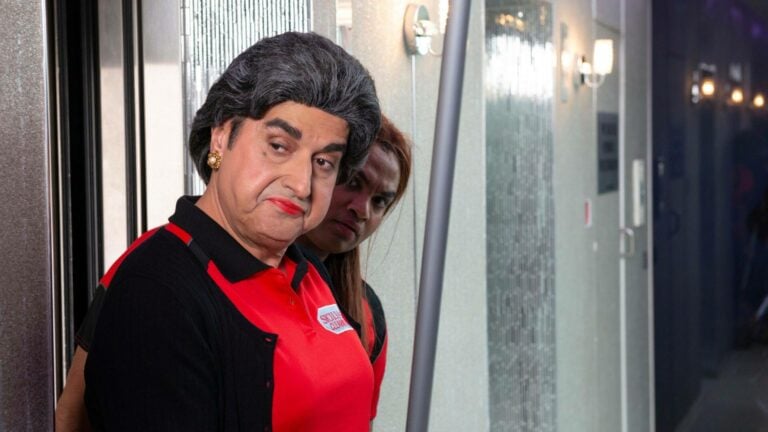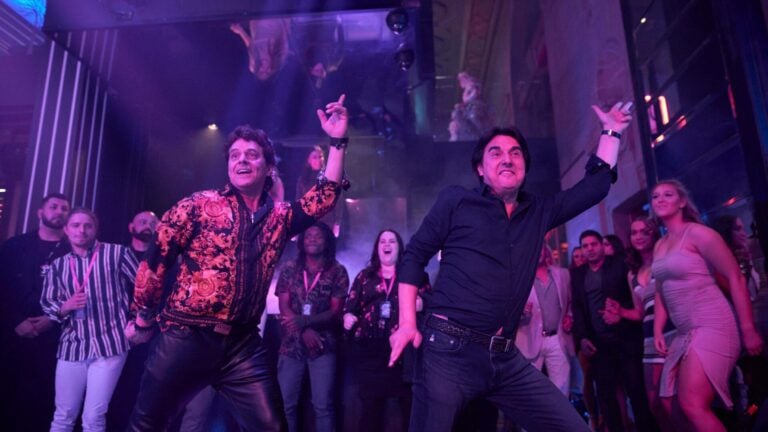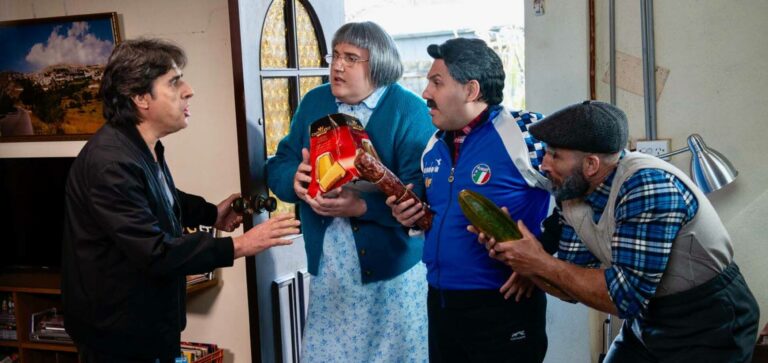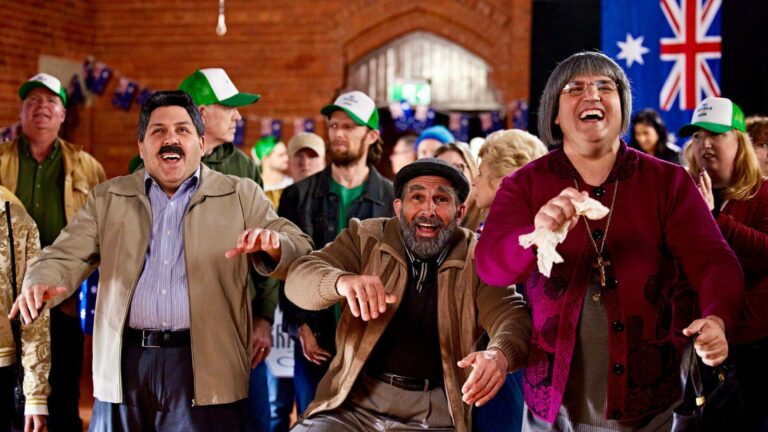When Nick Giannopoulos confirmed our interview about the return of the ‘Wog Boys’. I had all sorts of flashbacks. Giannopoulos’ original Wog Boy film was my first immersion into the “wog” culture, in my first year in Australia.
My new friends sat me down and submerged me in “wog comedy”. A binge weekend that included Wog Boy 2: Kings of Mykonos, and episodes of Acropolis Now. A training session, to understand what people meant when they’d refer to me as a “wog”.
The label, was either being assigned to me on different social occasions at the mere sound of my surname, or I would hear it be thrown around, ironically, when a non-Anglo migrant would enter the room. Every time I was called a “wog”, I’d lose an inch of confidence, while trying to belong. I’d laugh it off with everyone else in the room.
For someone that hasn’t grown up in Australia, it is a hard pill to swallow, whether ‘wog’ is assigned to you as a slur, or a badge of honour. It triggered me, but at the same time when I sat down to watch Wog Boy it got to me. It made me laugh, cry, scream, swear. I liked it. I hated it too, because I could relate. I saw my family in it (in Greece and in Australia), people I worked with in Melbourne; I saw myself. It was funny, raw, cringy, and fringe. It hit several buttons.
When rumours of a third in the franchise of ‘wog’ firms popped up on social media, during lockdown, I got excited, and sceptical.
Is Steve Karamitsis still relevant? Would he have managed to survive 2020 solely on his antics? Nick Giannopoulos posted his commitment to the third instalment, but what would Karamitsis’ life have to say in an era where everything is questioned?
“It was a wonderful experience making Wog Boys Forever. I felt lucky to be able to revisit a character that has become iconic in Aussie film history,” Giannopoulos says, after the film’s sold out premiere. He reflects on the three tumultuous years it took him to make this instalment a reality.
“The best part was being able to pop back into Steve’s life 12 years since the last time we saw him. We soon see that he still has elements of the old Steve but there is also so much that has changed about him. He has had to learn some very valuable life lessons along the way.”

Indeed, Wog Boys Forever finds Steve in his middle aged, still single and driving a taxi. A departure from Steve in Mykonos, dancing the zeibekiko and in love with the beautiful Greek girl, Zoe.
Now, on the beat, in Melbourne’s suburbs, all that is a long time ago. He is lonely and lost his ‘wogboy’ mojo, until an old flame, Cleo, jumps into his cab. Steve quickly realises that he made a huge mistake with Cleo and she could very well be the one that got away.
He realises that the only way to get her back and to deal with his new found enemies, who want to destroy him, is to somehow find that old Steve mojo again. Regain his ‘wogboy’ superpowers.
I could relate again. After two long pandemic years that shook my world, a huge part of me feels like I’ve lost my mojo. The fearless Greek girl that would attempt anything, is too shell-shocked to take risks.
“You’re not the only one,” Giannopoulos says. “The ‘wogboy’ fans have never stopped asking me if I was ever going to do another one. As soon as the lockdowns started in Melbourne I made a decision to not just sit around doing nothing but to be productive and finally finish off the script for the third wog boy film. In hindsight, it was the best thing I could’ve done because it kept me in a positive state of mind and gave me something to look forward to when it was all over.”

Steve Karamitsis is scarred by the passing of time and the ripples of life, so is Giannopoulos. Yet through his own battles, he found the courage to create and lift himself up. He alchemised his darkness and turned his lockdown struggles into a hero’s journey. One that honours the impermanence of life and its cycles.
“After a very short and unexpected illness, my father passed away just after I had finished the script and before we started shooting,” Giannopoulos tells Neos Kosmos.
“I used to talk to him about the new film and what it was going to be about. Every time he laughed at something it gave me a lot of confidence. I have dedicated this film to him and also Vince Colosimo’s father and the brothers from Sooshi Mango, Joe and Carlo Salanitri’s father, as all three sadly passed away within a year of each other. Our parents of that generation all came to this country and worked incredibly hard to help give us a better life. Our parents sacrifice is something that should never be forgotten. We enjoy the wonderful lives we have in Australia and have everything we have because of their sacrifice and commitment to making sure we had every opportunity available to us to become whoever we wanted. Their legacy will live forever and is a huge part of this film.”

Every push forward into the light is shadowed by challenges, the Greek Australian comic says. Comedy has always been a way for civilisation to process dark or “touchy” subjects.
Humour was untouchable and “wogs” like Giannopoulos used laughter to push back against racism and turn the immigrant’s stigma into an identifier one could proudly wear on their sleeve. As much as the third instalment has been received with excitement, there are those who insist the “wog” narrative has gone out of fashion, even in comedy.
“Throughout my early years of growing up in this country in the late 60’s and throughout the 70’s I was constantly subjected to racist taunts and constant ridicule and was never allowed to feel like an ‘Aussie’ or that I actually belonged in this country, even though I had been born here. And also throughout the 70s and 80s the lack of cultural diversity on our TV and film screens meant that my way of life, for example living in a household where English was a second language made it very hard for me to identify with any aspect of my ‘Australian’ way of life being represented on our screens. When I graduated from The Victorian College of the Arts in 1985 as the first male of Greek descent, I immediately began to write material which reflected the Australia I had grown up in.”
‘Wogs Out of Work’, Giannopoulos’ first show opened at the first Melbourne Comedy Festival in 1987. At the time, he purposefully chose the word “wog” because it was the racist term that had been used against people in his community since he was born, he says.
“I wanted to take the power of that word away from the racists and use it in a positive way to describe ourselves.”
The show was meant to run for two weeks, it ran for three years, and was seen by over 700,000 people across Australia. Its success led to the creation of the TV sitcom ‘Acropolis Now’ which had a massive impact on multicultural Australia as the first prime time show on free to air TV to feature predominantly non-English speaking background Aussies as the stars. Giannopoulos’ first film ‘The Wog Boy’ (2000) continued these themes, elaborated on them extensively within a political context, and went on to become one of the most successful Australian films ever to be released. It connected with its intended audience who came back for repeated viewings as they identified with the themes of the film and recognised parts of themselves in the characters.
“‘Wog Boys Forever’ continues to address the socially relevant themes around identity and what it means to be an ‘Aussie’ in 2022,” Giannopoulos tells Neos Kosmos.
“Have some things changed since 2000? Or are they still the same? How have we progressed in terms of cultural acceptance and diversity in the twenty-two years since? How has this impacted the characters we got to know in that first movie? How is the so called ‘migrant’ experience now for the more recent arrivals to this country particularly from Asia and Africa? Are we less or more racist than we were back then? This film strongly challenges the whole concept of what it truly means to be an ‘Aussie’ in 2022. So yes, I do feel it is still very relevant and most importantly a part of our history that should never be forgotten.”
Here Giannopoulos shifts lanes, from laughter and reminiscences to unwavering seriousness.
“Comedy is more important now than ever,” he says and I know he means it. “Good comedy is a reflection of where we are at as a community.. of who we are right now. Comedy has the ability to highlight many important issues regarding morality and politics like no other artform. The power of laughter resonates through to our conscience like nothing else. When we all hear each other collectively laughing at the same things it creates a sense of unity and a feeling of not being alone in the world.”

Giannopoulos says it’s empowering, and reaffirming to hear lots of other people laughing at the same things that you laugh at.
The healing effect of that relevance and connection is evident. There is honesty in laughter that cannot be replicated like other emotions.
“But most importantly”, he stops. “Comedy can never exist without the principle of freedom of speech. In a true democracy that right must never be taken away from us. Just because sometimes you might not like what someone is saying does not give you the right to try and stop them from saying it. A powerful and functioning democracy must always preserve its citizens’ ability to think and speak freely at all times. Without the rule of freedom of speech, a society is no longer truly democratic but on its way to becoming a dictatorship.”
Just before I let him go, I ask him if based on Wog Boy’s two decades in addition to his career as one of Australia’s most favourite comedians, he believes that Aussie audiences are more or less interested in ethnic comedy.
“I personally don’t like the term ‘ethnic’ comedy,” he hits back.
“It marginalises what we do. It’s Australian comedy. I was born here. I am an Australian of Greek heritage.
“In answer to your question ‘Wog Boys Forever’ has just recently become the most successful Independent Australian film of the year in cinemas, so yes, people are still very much interested in comedy, especially Australian comedy. I hope that gives you something to think about.”
I reflect on Giannopoulos‘ last thoughts. We often tend to trigger and limit ourselves by taking labels too personally, perpetuating the trauma.
We all seek to belong in a group and want acceptance, but at the same time, we strive to identify as individuals.
We are all Australian, in different ways, and that’s what makes this country special.
Wog Boys Forever is currently screening in cinemas across Australia.